

Reasons We Use Alliteration. Edurete.org. The most important formal aspects of Anglo-Saxons poetry were stress and allitteration.
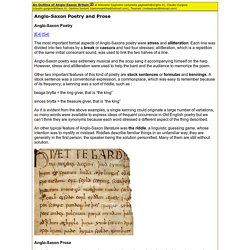
Each line was divided into two halves by a break or caesura and had four stresses; allitteration, which is a repetition of the same initial consonant sound, was used to link the two halves of a line. Anglo-Saxon poetry was extremely musical and the scop sang it accompanying himself on the harp. However, stress and allitteration were used to help the bard and the audience to memorize the poem.
Other two important features of this kind of poetry are stock sentences or formulas and kennings. A stock sentence was a conventional expression, a commonplace, which was easy to remember because of its frequency; a kenning was a sort of riddle, such as : beaga brytta = the ring giver, that is “the king” sinces brytta = the treasure giver, that is “the king” An other typical feature of Anglo-Saxon literature was the riddle, a linguistic guessing game, whose intention was to mystify or mislead.
AD's English Literature : Anglo – Saxon Prose Writers: King Alfred, Aelfric, Wulfstan Is So Famous? But Why? Until the 9th century literary prose did not develop in England.
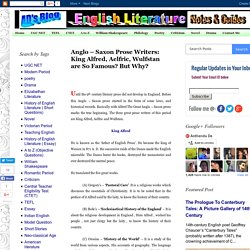
Before this Anglo – Saxon prose started in the form of some laws, and historical records. Basically with Alfred The Great Anglo – Saxon prose marks the true beginning. The three great prose writers of this period are King Alfred, Aelfric and Wulfstan. He is known as the ‘father of English Prose’. He became the king of Wessex in 871 A. He translated the five great works.
(A) Gregory’s – ‘Pastoral Care’ :It is a religious works which discusses the essentials of Christianity. (B) Bede’s – ‘Ecclesiastical History of the England’ – It is about the religious development in England , Here Alfred , wished his people , not just clergy but the laity , to know the history of their country. Anglo-Saxon literature: Poetry. There are two types of Old English poetry: the heroic, the sources of which are pre-Christian Germanic myth, history, and custom; and the Christian.
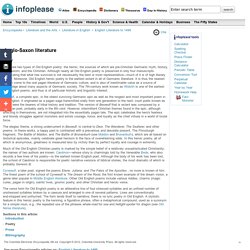
Although nearly all Old English poetry is preserved in only four manuscripts—indicating that what has survived is not necessarily the best or most representative—much of it is of high literary quality. Moreover, Old English heroic poetry is the earliest extant in all of Germanic literature. It is thus the nearest we can come to the oral pagan literature of Germanic culture, and is also of inestimable value as a source of knowledge about many aspects of Germanic society. The 7th-century work known as Widsith is one of the earliest Old English poems, and thus is of particular historic and linguistic interest. Beowulf, a complete epic, is the oldest surviving Germanic epic as well as the longest and most important poem in Old English. The Columbia Electronic Encyclopedia, 6th ed. See more Encyclopedia articles on: English Literature to 1499.
The characteristics of Anglo-Saxon poetry - BritLitBernie2012 Wiki - Wikia. Copied and then edited from those "vypracované otazky verze 2" 600 – 1100 AD (up to 1066) Wiki(en)

Weekdays Names and History. Weekday Names and History The influence historically of the Roman cosmology can be demonstrated in the seven names of the weekdays in Italian, Spanish, and French.
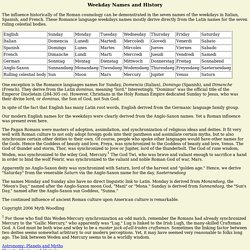
These Romance language weekdays names mostly derive directly from the Latin names for the seven ruling celestial bodies. One exception is the Romance languages names for Sunday, Domencia (Italian), Domingo (Spanish), and Dimanche (French). They derive from the Latin dominus, meaning "lord. " Anglo Saxon Kingdoms language Old English.
Primary History - Anglo-Saxons - Kings and laws. Anglo Saxon period of history. Anglo Saxon Period Anglo Saxon Period.
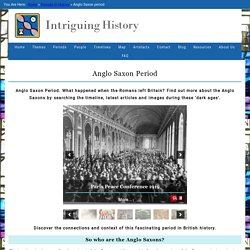
What happened when the Romans left Britain? Find out more about the Anglo Saxons by searching the timeline, latest articles and images during these ‘dark ages’.
Beowulf: Context. Though it is often viewed both as the archetypal Anglo-Saxon literary work and as a cornerstone of modern literature, Beowulf has a peculiar history that complicates both its historical and its canonical position in English literature.
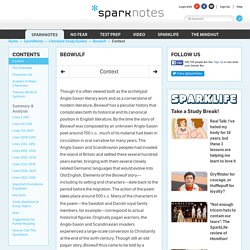
By the time the story of Beowulf was composed by an unknown Anglo-Saxon poet around 700 a.d., much of its material had been in circulation in oral narrative for many years. The Anglo-Saxon and Scandinavian peoples had invaded the island of Britain and settled there several hundred years earlier, bringing with them several closely related Germanic languages that would evolve into Old English.
Life in Anglo-Saxon England. 1.
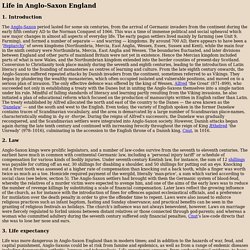
Introduction The Anglo-Saxon period lasted for some six centuries, from the arrival of Germanic invaders from the continent during the early fifth century AD to the Norman Conquest of 1066. This was a time of immense political and social upheaval which saw major changes in almost all aspects of everyday life. The early pagan settlers lived mainly by farming (see Unit 9, Farming), and formed a number of separate — and warring — kingdoms. By around 700 AD, there appears to have been a ‘Heptarchy’ of seven kingdoms (Northumbria, Mercia, East Anglia, Wessex, Essex, Sussex and Kent), while the main four in the ninth century were Northumbria, Mercia, East Anglia and Wessex. 2. Anglo-Saxon kings were prolific legislators, and a number of law-codes survive from the seventh to eleventh centuries. 3. 4.
A substantial literature survives from Anglo-Saxon England in both Latin and Old English. Other original writings in Old English include sermons, saints’ lives and wills. 5. 6. 7. Websites. History - Ancient History in depth: The Anglo-Saxons.